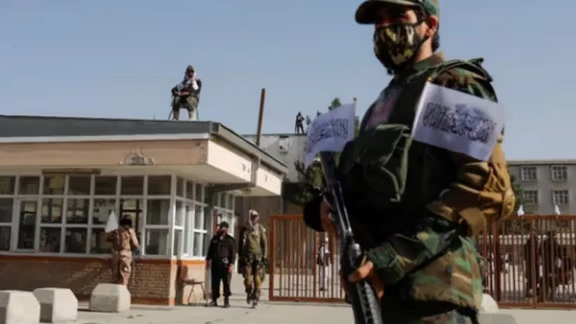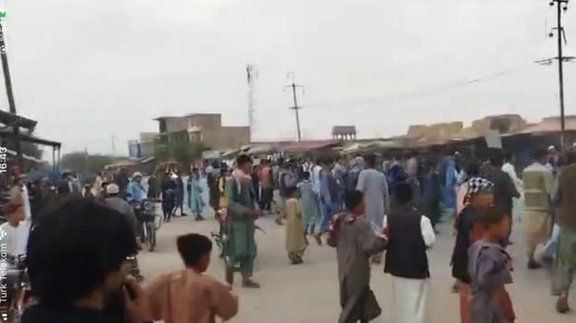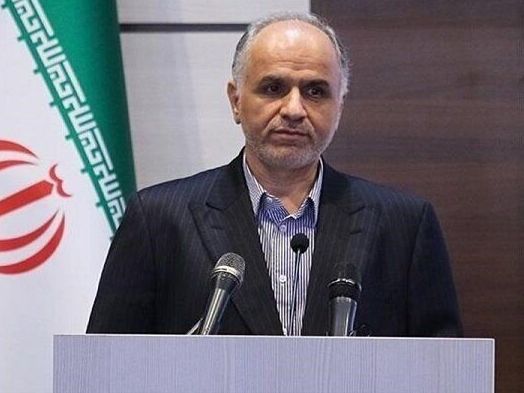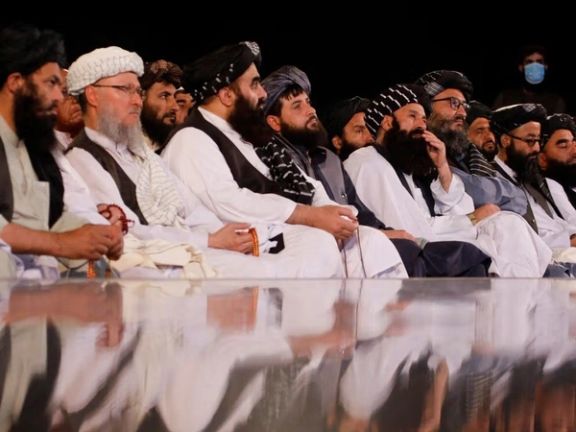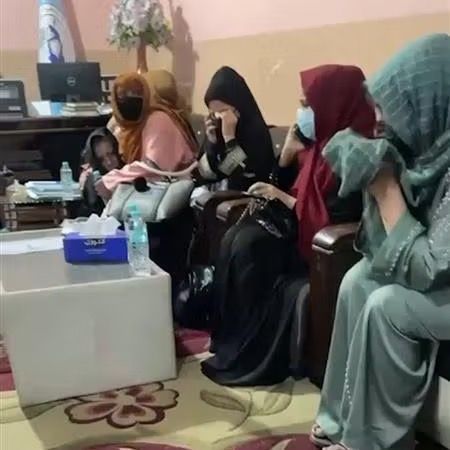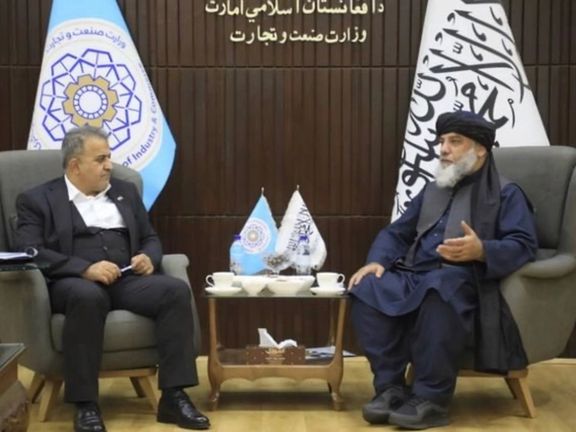An investigation by Afghanistan International indicates that certain Taliban figures are directly involved in the ephedra trade.
Research conducted in Kandahar, Helmand, Farah, Zabul, Ghor, and Uruzgan provinces, combined with information from credible local sources, reveals that hidden collection centers for ephedra, the key ingredient for meth production, remain active across these regions.
Local sources say this drug trade has flourished under Taliban rule. Farmers in the south report that some Taliban commanders either permit the production and smuggling of ephedra or impose taxes on groups engaged in the trade.
The plant grows naturally in Afghanistan’s central and southern highlands, especially in Ghor, Daikundi, and Uruzgan, and has rapidly become a crucial raw material for methamphetamine production.
Reports indicate the drug is trafficked through Nimruz, Farah, and Balochistan to Iran, Türkiye, and even Europe.
Although Taliban leader Hibatullah Akhundzada banned the cultivation and trafficking of narcotics in 2022, neighboring countries have repeatedly claimed that drug smuggling from Afghanistan has increased. With opium smuggling reduced, the ephedra trade has expanded to such an extent that it has drawn the attention of international counter-narcotics agencies.
Who Profits from the Ephedra Trade?
A lack of basic services in remote areas, widespread unemployment, and the absence of crop-substitution programs have long pushed rural communities to rely on poppy cultivation as their primary source of income.
The Taliban’s narcotics ban has dealt a severe economic blow to thousands of farmers. In many remote areas, they have now turned to harvesting the ephedra plant.
Haji Amanullah, a farmer from Deh Rawood district in Uruzgan, explained: “Ephedra grows naturally in the mountains. It doesn’t require planting, irrigation, or much effort. People simply go to the mountains, collect it, dry it, and traffickers buy it. The process is simple, and the profit motivates farmers to keep doing it.”
Farmers say collecting ephedra is a hidden but thriving trade, with demand rising daily and underground drug networks remaining strong.
According to Amanullah, dried ephedra sells for about 400 Afghanis per kilogram, and daily income from harvesting it often surpasses earnings from other agricultural work. Children, young men, and even women in mountainous regions participate in gathering the plant.
As with poppy and other narcotics, most profits from ephedra go to traffickers rather than farmers.
Amanullah Pir noted: “Even with poppy, the real profit never went to the farmers, it was the big traffickers and middlemen who benefited most. We farmers were just happy to get a small share. The difference with ephedra is that it requires no planting or care, yet still brings large profits, mainly for traffickers and powerful individuals.”
He added that deepening poverty, limited economic opportunities, and strong global demand for narcotics have driven many farmers to choose ephedra as a replacement income source.
Ephedra: Economic Lifeline or Emerging Crisis?
Residents of southern Afghan provinces say that economic hardship, unemployment, and the Taliban’s poppy ban have pushed them toward harvesting the ephedra plant.
Sources report that the trade is expanding daily in districts across Helmand, Uruzgan, Ghor, Daikundi, Kandahar, Bamiyan, and Farah provinces.
Asadullah, a resident of Sangin district in Helmand and owner of an ephedra-processing facility, said: “After the poppy ban, this new trade has become an important source of income for people.”
He added: “Now everyone in Helmand is involved in it. If you invest five to seven hundred thousand Afghanis, you can double it in two months. It’s simple work, all you need is a grinder, a container, and a few bottles.”
According to Asadullah, the process is so easy and profitable that people often collect the plant from the mountains themselves and sell it at low prices to drug traders.
He explained: “Using simple acid, water, and heat, the plant is turned into a substance called ephedra, which is then used to produce crystal meth.”
Neda Mohammad, a resident of Uruzgan, said the plant has now become a daily source of income for many in the province: “The collection of ephedra has grown so much that people hire four or five workers every day to gather it from the mountains, earning between 1,000 and 2,000 Afghanis daily. It’s good business because many are involved in it.”
Reports from remote districts of Kandahar, including Nesh, Mianashin, Khakrez, and others, indicate widespread harvesting, with some local Taliban commanders also cooperating in the trade.
Abdullah, a resident of Nesh district, described the process: “The dried leaves of ephedra are ground, soaked in acid overnight, then burned to produce a yellowish substance that is later made into crystal meth.”
Abdul Ali, a former herbal medicine seller who has moved into the narcotics business, explained: “This plant used to be a remedy for coughs and colds, but now it has taken on a new role. We are rural people with no doctors, this was our family medicine for centuries. Now it’s used for making drugs. It’s dangerous, but it brings high profits.”
In the mountainous areas of Sangin, Baghran, and Musa Qala in Helmand; Khakrez, Nesh, and Ghorak in Kandahar; and Gizab and Khas Uruzgan, residents collect the plant from afternoon until sunset and sell it cheaply.
Although the Taliban claim to have halted ephedra production and shut down processing plants, evidence on the ground tells a different story. Locals say they collect the plant out of necessity, while drug traders process it and export it abroad.
Taliban’s Position on Ephedra
Ephedra, now a key part of Afghanistan’s drug economy and a trade involving some local Taliban commanders, as become a major challenge for the Taliban government.
The Taliban’s counter-narcotics directorate says that over the past year it has destroyed 1,400 drug production facilities and laboratories, including those producing methamphetamine, and referred nearly 14,000 traffickers and traders to the judiciary. Officials also claim that ephedra production has been reduced by 80 percent.
However, local and international sources present a different picture. At a UN conference, Iran’s Interior Minister Eskandar Momeni said that in the first 10 months of this year, trafficking of synthetic drugs from Afghanistan to Iran had risen by 20 percent. He noted that while opium smuggling has declined, trafficking of synthetic drugs, particularly methamphetamine, continues.
Taliban officials insist they are taking serious action against drug trafficking. Mullah Abdul Haq Hamkar, Deputy Interior Minister for Counter Narcotics, stated that in the past three months, nearly 84,000 kilograms of ephedra had been seized and 27 methamphetamine factories shut down.
A source in the Taliban’s counter-narcotics office in Kandahar told Afghanistan International that the plant has been banned in some provinces since December 2021, but many still collect it out of poverty or to meet market demand.
Experts warn that without addressing Afghanistan’s economic crisis, strengthening the rule of law, improving transparency, and enhancing regional cooperation, replacing the drug economy will be a long and difficult process.
Hidden Trade: The Role of Local Taliban Officials
Although the Taliban government has officially banned the cultivation, production, use, and trafficking of narcotics, findings by Afghanistan International supported by accounts from local sources and eyewitnesses, indicate that Taliban commanders, major former traffickers, and certain local officials are involved in the ephedra trade.
Among the figures named are some of the Taliban’s most prominent financial backers from its first regime: Haji Bashir Noorzai, recently freed from a US prison and now living in Kandahar; Mullah Qayyum Zakir, deputy defense minister; Naim Barich, Taliban governor of Nangarhar; Hedayatullah Badri, Taliban minister of mines, and members of his family; as well as several governors and local commanders.
Sources say this new ephedra trade is largely driven by these networks, who seek to expand it quietly but extensively.
A resident of Nesh district in Kandahar, speaking anonymously, said: “At the local level, district governors and commanders are involved in trafficking and processing this plant. Ordinary people can’t produce or sell it. Local officials use certain people to gather and grind the plant, then send it to areas where crystal meth is made.”
Available data shows that four kilograms of ephedra sell for between 100 and 300 Afghanis, and 30 kilograms of the plant yield one kilogram of processed ephedra.
A source confirmed that crystal meth labs remain active in Bakwa district of Farah, as well as in Sangin, Musa Qala, and Gereshk in Helmand.
Residents of Nesh report serious disputes within the Taliban over control and trafficking of ephedra, sometimes escalating into armed clashes. Eyewitnesses say two such clashes occurred in Nesh over the past year, resulting in deaths and injuries.
One local resident explained: “In the past year, there have been two incidents in Nesh. One Taliban group is trying to stop the ephedra trade, while another, sent from the center and linked to former jihad commanders, gathers, processes, and ships the plant elsewhere.”
He added: “This isn’t just a religious issue; it’s a financial dispute. One side sees it as enforcing Sharia, the other as a legitimate source of income.”
Locals say they have repeatedly reported the situation to central authorities, but no serious action has been taken. Disputes over ephedra are not limited to Nesh, similar tensions exist in Nimruz, Helmand, Farah, and Uruzgan. Sources say even intervention from the capital sometimes fails, as each faction has its own justification.
Farmers in southern Afghanistan claim that high-ranking Taliban commanders and officials have preserved the drug trade through their networks and civilian contacts, while bans are enforced only on ordinary farmers.
Haji Amanullah, a resident of Deh Rawood district in Uruzgan, said collecting ephedra is an effective way to strengthen the local farming economy and support poor communities “Gathering ephedra is the easiest and cheapest way to earn money, and access to its market is simple.”
Despite repeated Taliban claims of launching an unprecedented campaign against narcotics, global skepticism is growing. New information shows that trafficking of synthetic drugs from Afghanistan not only persists but, according to data from some neighboring countries, has actually increased.
Reports from officials of the Islamic Republic of Iran, in particular, have challenged the Taliban’s assertions about counter-narcotics efforts.
Young people exposed to acid fumes during ephedra processing suffer health problems such as shortness of breath, headaches, and even paralysis. Locals say the work is often carried out under compulsion or due to poverty.
The United Nations has repeatedly warned that ephedra is at the center of a new drug crisis.
UN data shows that in 2021, methamphetamine seizures in Afghanistan rose from 100 kilograms to 2,700 kilograms. In 2023, Iran seized 662 tons of various narcotics, most of them originating from Afghanistan.
